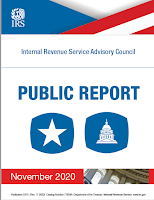The Internal Revenue Service Advisory Council (IRSAC) conveys the public's perception of IRS's activities and plays a significant role as external evaluator regarding the reorganization and its implementation. The Council advises the IRS regarding tax administration policy, programs, and initiatives, and they sees a danger in chronic underfunding of the agency.
IRSAC made the point in its annual report, which also highlighted the importance of the Taxpayer First Act and opportunities to expand the e-filing and online application process.
The 2020 Public Report includes recommendations on 26 issues, which cover a broad range of topics, including:
- Funding of the IRS
- The Taxpayer First Act
- Expansion of e-File
- Proposal for an early exam program for Large Business
- Telephone response times for the Practitioner Priority Service
- Resources for Native American taxpayers and federally recognized tribes
- Taxpayer Digital Communications
Inadequate IRS funding is a fundamental risk to tax administration. “A tax system rooted in voluntary compliance requires appropriate levels of customer service and enforcement, both of which depend upon adequate and consistent funding,” the report said. “Congressional appropriations provide the vast share of operating funds for the IRS to administer the nation’s tax system, and collect over $3.1 trillion in net revenue.”
Federal Taxes Collected By The IRS.
Yet “Overall Funding For The IRS Has Decreased Roughly 20 % On An Inflation-Adjusted Basis Since FY2010,”
Added Charles Read, CEO Of GetPayroll In Lewisville, Texas.
“The result of these budget reductions since FY 2010 is a 22 percent decline in the number of employees at the agency and a 30 percent decline in the number of employees working in enforcement roles.”
Among IRSAC’s recommendations are advocacy for funding at a level no lower than the FY2010 benchmark adjusted for inflation, or $14.3 billion, or at minimum a level that will provide for a net increase in staffing on a sustained yearly basis; and advocating for consistent or multi-year funding for long-term initiatives, including the customer service strategy, training strategy and business modernization plan.
Have IRS Tax Problems?
Contact the Tax Lawyers at
Marini & Associates, P.A.
www.TaxAid.com or www.OVDPLaw.com
or Toll Free at 888 8TAXAID (888-882-9243)
Read more at: Tax Times blog












